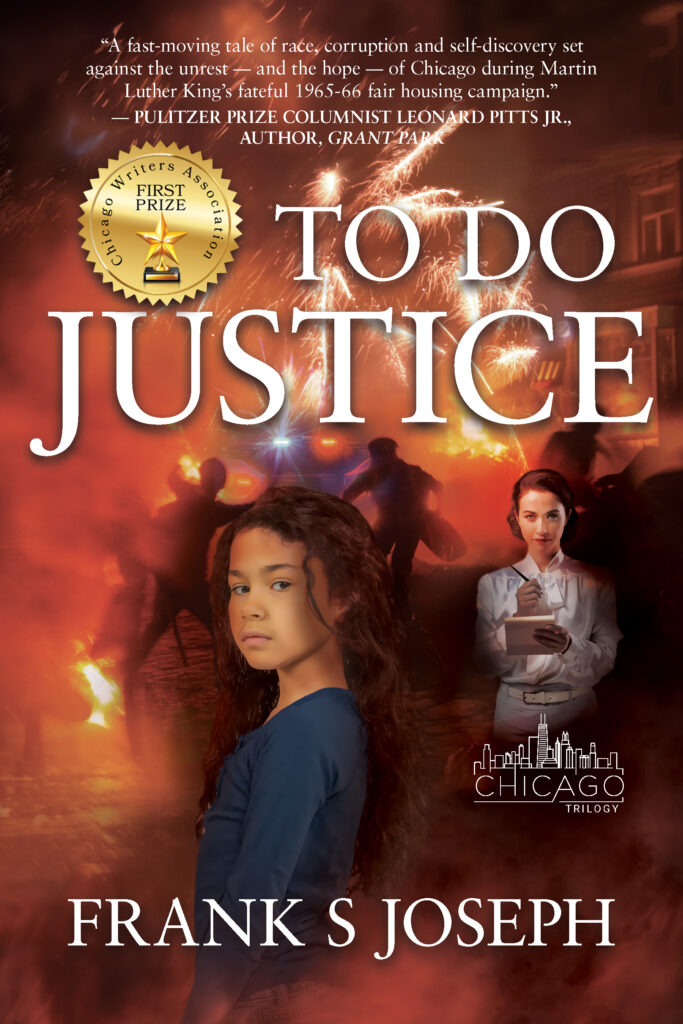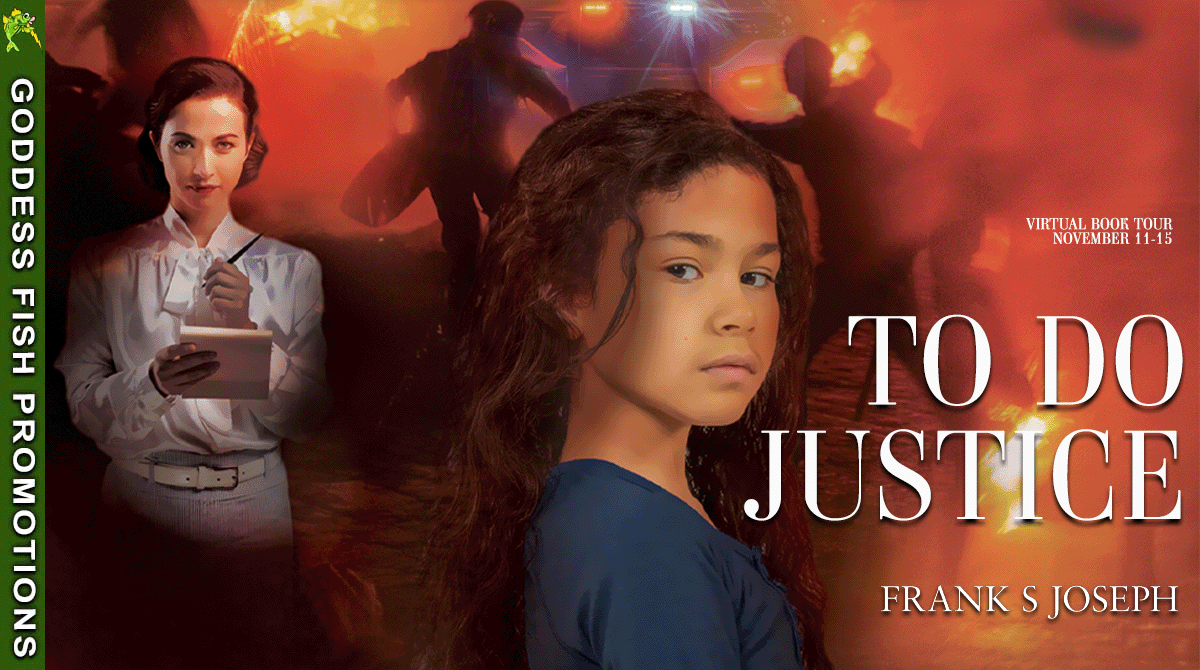Historical novelist Frank S. Joseph chats with me today about his new novel, To Do Justice.

During his virtual book tour, Frank will be giving away a $20 Amazon or Barnes and Noble (winner’s choice) gift card to a lucky randomly drawn participant. To be entered for your chance to win, use the form below. To increase your chances of winning, feel free to visit his other tour stops and enter there, too!
Bio:
Frank S Joseph’s “Chicago Trilogy” novels — To Love Mercy, To Walk Humbly, and To Do Justice — tell a story of lives forever changed by racial turmoil that marked and marred Chicago at mid century, a great city going up in flames.
Frank lived it. He came of age in the ’40s and ’50s as a sheltered White boy in comfortable South Side neighborhoods undergoing racial turnover and “white flight.” And in his 20s, as an Associated Press correspondent, he covered the ’60s riots that wracked Chicago’s inner city as well as the ’67 Detroit riot, where 37 died, and the notorious ’68 Democratic National Convention street disorders.
Frank left Chicago in 1969, landed at The Washington Post during Watergate, and went on to a career as an award-winning journalist, publisher and direct marketer. His Chicago Trilogy novels all have won award after award, most recently TO DO JUSTICE winning the Chicago Writers Assn. novel contest and being named an IndieReader Best Book
To Do Justice, Trilogy Book III, is out from Key Literary. To Love Mercy, Trilogy Book I, and To Walk Humbly, Trilogy Book II, are forthcoming from Key Literary. To Love Mercy was previously published in 2006 by Mid Atlantic Highlands.
Frank and his wife Carol Jason, an artist and sculptor, live in Chevy Chase MD. They are the parents of Sam and Shawn.
Welcome, Frank. Please tell us about your current release.
It’s 1965, summer in Chicago, and it’s hot. Pinkie looks white but is being ‘raised Black’ by shiftless Jolene — who’s in it for Pinkie’s child support check and nothing more. But how did Jolene come to be raising Pinkie anyway? Join this daughter of the city’s meanest streets as she sets out on a quest to find the White woman who gave her birth, braving the inner-city riots of the turbulent ‘60s to discover who she really is.
An IndieReader Best Book; finalist for Chicago Writers Assn. Book of the Year and First Prize, CWA novel contest; 5 Stars from Reedsy Reviews, Readers’ Favorite and Midwest Book Review.
What inspired you to write this book?
I lived the first 29 years of my life in Chicago. When I was a kid, I’d ride with my dad to see White Sox games. In those long-ago days, the road to “Sox Park” went through Bronzeville, then Chicago’s Black ghetto. (I am White.) As the car approached Bronzeville, my dad said, “Lock the doors.” Naïve I may have been, but I wasn’t stupid. To my 6-year-old mind, “Lock the doors” meant Bronzeville was the most dangerous place on the planet. That was the seed that sprouted into To Love Mercy, the first novel of my “Chicago Trilogy.” Set over 5 days in 1948, it follows a White boy (like me) and a Black boy like no one I’ve ever known — Jesse Owens Trimble, nicknamed “Sass” for his smart mouth. They meet in a dark parking lot following a White Sox game … an accident ensues … and Steve’s White family must take the injured Sass to an emergency room. That touches off an all-day-all-night odyssey across a hostile city on a quest for a mysterious missing silver talisman. Flash forward to the ‘50s for the second book of the Trilogy, To Do Justice; then on to the urban riots of the mid ‘60s and To Do Justice, Trilogy Book #3.
Excerpt from To Do Justice:
Ever since I’m little I be wondering who my momma is.
It ain’t Jolene. Jolene been raising me but I ain’t her blood. Reminds me of it every chance she gets. Picked me out of a trash pile one day, that’s what Jolene says. Like a maggot out of a garbage can.
If I’m trash I say, why you done it? Just teasing she says, you be worth real money, check for $102.80 on the first of every month. Calls it her Pinkie check. Long as the Welfare keeps sending the Pinkie check, that’s all she cares about, Jolene.
Jolene just laughs when I ask about my real momma. One day I be finding her though. See does Jolene laugh when that day comes.
Jolene don’t treat Bettina no better than me even though Bettina be blood and flesh to her. Bettina asks who her poppa was but Jolene pretends she don’t hear. Poor little thing, Bettina, bumping into things like she does. Jolene says Bettina was born with a caul, that’s why she so clumsy. I know better though. Bettina can’t help it. Something wrong inside her head. She plenty smart all right, just something inside there don’t work how it’s supposed to, like a doorbell is busted or a toaster don’t pop.
All Jolene cares about is the money though, $102.80 a month for me and $94.73 for Bettina. And Bettina’ll be worth more soon Jolene says, worth as much as you gal, $102.80 a month when she turns nine. Then in September when you turn twelve, you’ll be worth $106.35, and Jolene grins.
No wonder Jolene gets so happy when she talks about the money. We’re her most valuable property. That’s why I got to protect my baby sister best I can. Bettina’s my most valuable property. Till I find my real momma, Bettina’s the closest thing to kinfolk I got in the world.
Should’ve protected Bettina better than I did though, the day things got turned upside-down.
What exciting project are you working on next?
Something completely different! A dystopian satire – OK, scifi – in which Puerto Rico achieves domination of the world. Oh, and it’s funny.
When did you first consider yourself a writer?
I first considered myself a reader. That was in first grade, when I learned to read. I was an un-athletic kid, the kind who’s picked last then argued over (‘You gotta take him, we took him last time’). Not surprisingly, I responded by sticking my nose in a book, then another and another and another. After a while it became easy to imagine writing one.
Do you write full-time? If so, what’s your workday like? If not, what do you do other than write and how do you find time to write?
I wish I wrote full-time. Instead, I spend most of my time doing other things, i.e. procrastinating. But I never stop thinking about what it is that I’m avoiding writing.

What would you say is your interesting writing quirk?
Nothing. I must be the boringest writer around. I just sit there and type.
As a child, what did you want to be when you grew up?
A milkman. Back in those long-ago days, other Chicago dairies had milk trucks but ours still had a horse, a dapple-gray named Mike, to pull the milk wagon through the alley behind our apartment building. That was the first thing I wanted to be. Then I learned to read, and “writer” followed close behind.
Anything additional you want to share with the readers?
I’m old, yeah – old enough that things I write from my growing-up are classed as “historical fiction”. But I was a good noticer, and the things I’ve noticed have given me the stories I now share with readers like you.
Links:
Website | Facebook | Instagram | Twitter/X


We appreciate you featuring TO DO JUSTICE today.
And thanks from me, the author, too. I’m pleased to be here and grateful to Lisa for hosting. If you’d like to reach out to me, I’ll be around all day to answer questions and respond to comments. Check out my website too — https://frankjoseph.com.
I like the excerpt. Sounds really interesting.
Thanks so much! I hope you’ll read it, enjoy it, and post a review — here, on Amazon, wherever you like. Reviews are lifeblood for obscure authors like me.
Thank you for the interview! 🙂
Glad you liked it. I hope you’ll read the novel, and leave a review as well. Authors like me live and die with reviews.
This sounds like an interesting read.
All I can say is … professional reviewers are giving it 5 stars. But read it for yourself and see. Then, if you feel so moved, post a review on Amazon plus anywhere else you hang out. Authors — espy. little-known ones like myself — depend on reviews for recognition.
interesting
Interesting enough, I hope, that you’ll read and review it! 🙂
I’m looking forward to reading this book. Thanks for sharing.
Michael — Thank you too! I do hope you read and enjoy it. It’s free on Kindle Unlimited, in case you’re a member.
Very interesting and enjoyable author interview!! I especially liked the milk man career story and about the new Puerto Rico domination book in the works!! Thanks for sharing!!